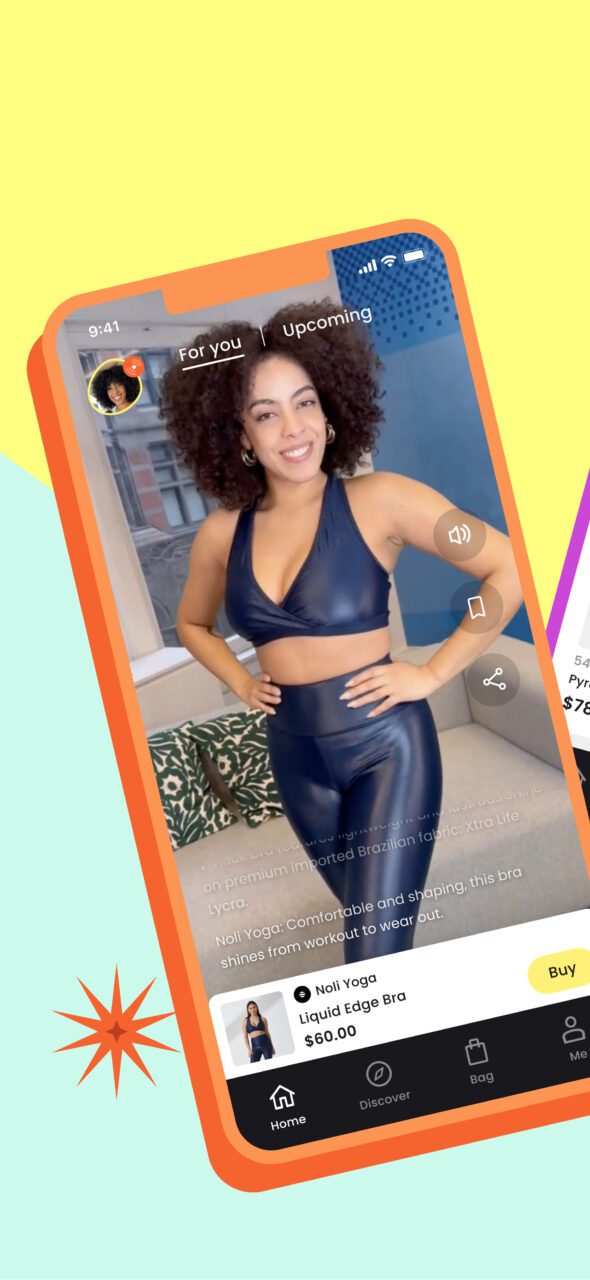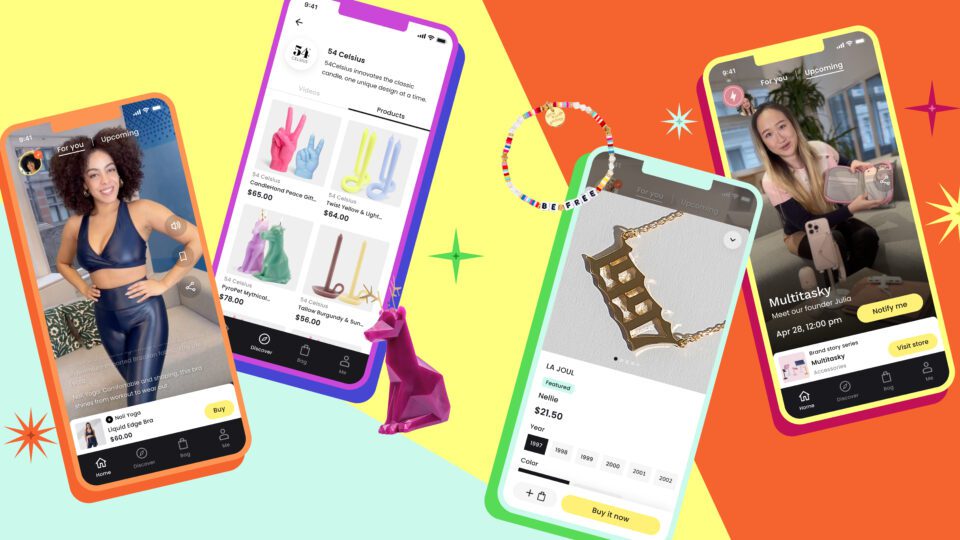Long before there was livestreaming, social media or even the internet, there were home shopping networks — and the undisputed leaders of that realm were QVC and HSN, now both operated under the umbrella of Qurate Retail Group. But the heyday of “home shopping” in that context is now firmly behind us. Consumers, especially younger ones, have moved on to places like Netflix, YouTube and TikTok. They are absolutely still interested in shopping from home, as illustrated by the steady march of ecommerce growth, but they are less and less interested in doing it in the old format: watching a host showcase wares on linear television and then calling in to make an order.
While Qurate’s brands still reach millions of homes through its more traditional programming, the company isn’t about to be left behind in the digital age. Hence the creation of vCommerce Ventures and the Live Shop Ventures division, where Brian Beitler serves as General Manager.
Beitler has built a career out of working with retailers that had, as he put it, “reached a point of maturity and were looking for the next stage of growth,” including Mattel, Toys ‘R’ Us, Bath & Body Works, David’s Bridal and Kohl’s — all brands that were at one point at the top of their respective games but eventually reached an inflection point where innovation was an existential necessity.
The same can be said of Qurate, but as Beitler sees it, Qurate’s business model “isn’t a thing of the past, it’s actually a pathway to the future.” Enter Sune, a shopping app founded by Beitler under the Qurate banner that is the company’s answer to the demands of the “Gen Zennial” consumer (as Beitler calls them).
“The vision is to create something that would give consumers a way to be entertained by shopping the way that we are in physical environments,” explained Beitler in an interview with Retail TouchPoints. “The digital shopping experience has become so transactional, it has lost the humanity and soul of what makes shopping so joyful. Especially when you don’t have [something particular] in mind, part of the joy is being surprised and amazed by what you see in shop windows or in the aisles. But the digital experience today is point and click, hunt and search. There’s no way to just sit back and have somebody bring you amazing products and stories to discover.”
Don’t miss the chance to hear from Beitler in person when he takes the stage at the Retail Innovation Conference & Expo in Chicago this June. Check out the full agenda here and register early to save on pass prices!
Making Shopping Itself the Entertainment
Soft-launched in beta in March 2023, Sune is currently available for anyone with an iPhone to try out. The app already features more than 400 brands and is built on a marketplace model. This business model is very different from the core QVC and HSN brands, which operate like a traditional retailer, owning the inventory they sell. And while Beitler declined to share specifics on the number of customers or downloads so far (to be fair, the Sune app is still in beta and hasn’t been promoted at all), he said that he’s “been very pleased with the number of consumers we’ve been able to get into the experience and the learnings we’ve garnered around what it’s going to take to build the next-generation live shopping platform for consumers.
“We really believe that v-commerce is the future of ecommerce,” Beitler added. “The primary reason we believe this is consumers today, particularly young consumers, discover almost everything through short-form video experiences.”
Beitler would know, both from his professional experience and as the father of six children, five of whom are girls and range in age from a 29-year-old “solid millennial” to a 13-year-old Gen Zer who “consumes everything in video format.” He has his own built-in focus group right at home.
“Our goal is to build a platform where shopping is the entertainment of the experience,” Beitler said. “Consumers [will continue to] discover products in videos on Instagram and YouTube and TikTok, but it’s different in those platforms because you don’t go there first to go shopping. I compare it to airports — we’ve all bought something in an airport because we’re there and we have time, but we don’t go to the airport to go shopping. Retail is going to work in TikTok and YouTube and Instagram, because anywhere you have a huge group of people and a little bit of space, there’s always room for commerce. But that’s different than opening an app to go shopping where the entertainment is shopping, instead of shopping being an interruption to the entertainment.”
A Live Shopping Experience Built for the U.S. Consumer
Qurate is far from the first company to try to replicate China’s success with livestream shopping in the U.S., but unlike many others that have tried, Qurate has more than 40 years of success in bringing live-shopping experiences to U.S. audiences. Beitler said the development of Sune takes into account three major differences between U.S. and Chinese audiences:
1. Appointment-based shopping just doesn’t work in America.
“In Asian markets the consumer will show up at a specific time, en masse, to shop a particular influencer, and the reality is that’s just not the nature of U.S. consumers,” he said. “Media consumption has taught us to expect content on-demand; in fact, I think sports is the last bastion of appointment-based media consumption [in the U.S.]. The live shopping experience for a U.S. consumer needs to be driven by something they’re in control of. They still want the serendipity and the magic of seeing a story told over video, and even seeing it told in a live-like way, but it’s got to be more on-demand.”
2. Personalization is crucial to the experience.
“[U.S. consumers] have grown accustomed to experiencing media and social feeds that are more tailored to who we are,” said Beitler. “It’s like The Matrix — the mall transforms around you and you feel like it’s your space. That’s what the digital shopping experience has to do. We’re working to enhance our algorithm and personalization capabilities to be able to adjust in the moment to shopping preferences; we think that’s really important for this kind of serendipitous storytelling-driven experience.”
But how does one create that serendipitous moment of discovering something unexpected within such a personalized environment? Beitler and his team are working on it: “We are endeavoring to build an app that will curate to your preferences but know how and when to surprise you with things that you’ve never asked for,” he said, adding that the effort is still a work in progress. “We’re young now,” Beitler said. “As our dataset grows, our ability to do that better and learn how to bring the joy of surprise and serendipity into a curated experience will grow.”
3. Who the storyteller is really matters.

“Consumers expect the storytellers, not just the products, to be someone that really feels like they get them or connect to them,” said Beitler. “It’s not just about finding the right voices. You could have two friends who both need the same product, but they might prefer different ways to have the story told. It’s a more nuanced and complicated approach for the sophisticated U.S. consumer.”
At the moment, the “voices” on Sune feature a combination of retained influencers (called “Sune-setters” in a play on “trendsetters”), who are the most similar to the typical home shopping host; large influencers from other platforms who typically focus on a specific area of expertise, like wellness or design; and brand founders. “There’s a lot of love for the authenticity of a founder, their narrative and their story,” said Beitler. “So regardless of whether the founder’s on or not, we often try to bring a bit of the brand narrative forward. Most of the brands on our platform are emerging and many are brands that you may not have heard of yet, but we think they’ve got a really compelling product and story.”
To that end, brands can’t pay to be featured in Sune. Every product is curated by the Sune team, which makes its money like any other marketplace, through fees and commissions.
40 Years of Experience Funneled into One App
Beitler said he expects the Sune app to move out of beta sometime this year, but Qurate is taking the long view on the endeavor.
“We’re still in build mode,” said Beitler. “This isn’t a short-term investment, a have-to-hit-it-out-of-the-ballpark-in-the-first-six-months kind of play for Qurate Retail Group. We innovated the video-shopping business 40 years ago, and we believe we’re in a really great place to take the things we’ve learned from our experience creating commerce that’s serendipitous and interesting and fun to discover at that scale — that is, the one-to-many model of television — into this space that’s more curated, shorter-form and faster for a younger audience. We believe we’re going to crack the code on building something that’s going to be really compelling for consumers as a new way to shop.”
Want to hear more about what Beitler and Qurate are building? Don’t miss the chance to hear from him live at the Retail Innovation Conference & Expo this June. Check out the full agenda here and register early to save on pass prices!













